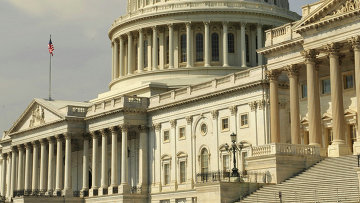MOSCOW, December 19 (RAPSI, Ingrid Burke) – A US Senate committee released a report Wednesday illuminating the enormous market for so-called “data brokers” that profit on the sale of data collected from “hundreds of millions” of consumers.
Data brokers are defined in the report as companies in the business of collecting, maintaining, and reselling information about customers for a variety of purposes, though the Committee focused on those that do so for marketing purposes.
The Senate Committee on Commerce, Science, and Transportation revealed in its report that these brokers collect scores of detailed data about hundreds of millions of consumers, including information about personal characteristics, preferences, health, and finances.
According to the report, such data ranges from benignly general to eerily specific: “Beyond publicly available information such as home addresses and phone numbers, data brokers maintain data as specific as whether consumers view a high volume of YouTube videos, the type of car they drive, ailments they may have such as depression or diabetes, whether they are a hunter, what types of pets they have; or whether they have purchased a particular shampoo product in the last six months.”
Perhaps more disturbing is the revelation that these data brokers tend to turn a profit by grouping financially vulnerable customers into specific classes that feature titles such as: Rural and Barely Making It, Ethnic Second-City Strugglers, Retiring on Empty: Singles, Tough Start: Young Single Parents, and Credit Crunched: City Families.
A similar trend described is that of the sale by at least one data broker of lists of the names and addresses of patients suffering from such devastating conditions as cancer, diabetes, and depression. Another list provides the names of consumers alongside their health conditions and credit scores, according to the report.
Another data broker advertised lists classifying vulnerable elderly individuals, including: “Elderly Opportunity Seekers, described as older people looking for ways to make money; Suffering Seniors, older people with cancer or Alzheimers disease; and Oldies but Goodies, people described as gullible . . . [who] want to believe their luck can change,” the report explains. (Internal quotes omitted.)
The report goes on to describe a company that sells a marketing tool aimed at helping to identify and effectively market to such “under-banked consumers” as widows and “consumers with transitory lifestyles, such as military personnel,” thus enabling companies that profit off of high-cost loans and financially risky products to target the more vulnerable populations.
Furthermore, the Committee found that data brokers have been collecting details of customers’ offline activities to sell for purposes of targeted online marketing. According to the report: “While American consumers are beginning to understand, and even expect, that their online activities will be tracked in order to send them online advertisements, it is unclear whether they understand the extent to which data concerning their offline activities also may be collected and used to tailor online advertisements.”
Specifically, information dealing with demographics, finances, and offline purchases and interests are provided so that clients of these data brokers might better focus advertising efforts.
As the Committee so ominously describes it, “data brokers operate behind a veil of secrecy,” amassing scores of data typically without interacting directly with consumers. Furthermore, it is common for data brokers to contractually prohibit clients from disclosing the sources of the data obtained.
The report added that giants in the field have been evasive with the Committee in terms of revealing practices common to their business.
The Committee concluded by urging policymakers to take action on the hushed industry, asserting: “consumers going about their daily activities – from making purchases online and at brick-and-mortar stores, to using social media, to answering surveys to obtain coupons or prizes, to filing for a professional license – should expect that they are generating data that may well end up in the hands of data brokers. They should expect that this data may well be amassed with many other details about them data brokers already have compiled. And they should expect that data brokers will draw on this data without their permission to construct detailed profiles on them reflecting judgments about their characteristics and predicted behaviors.”



